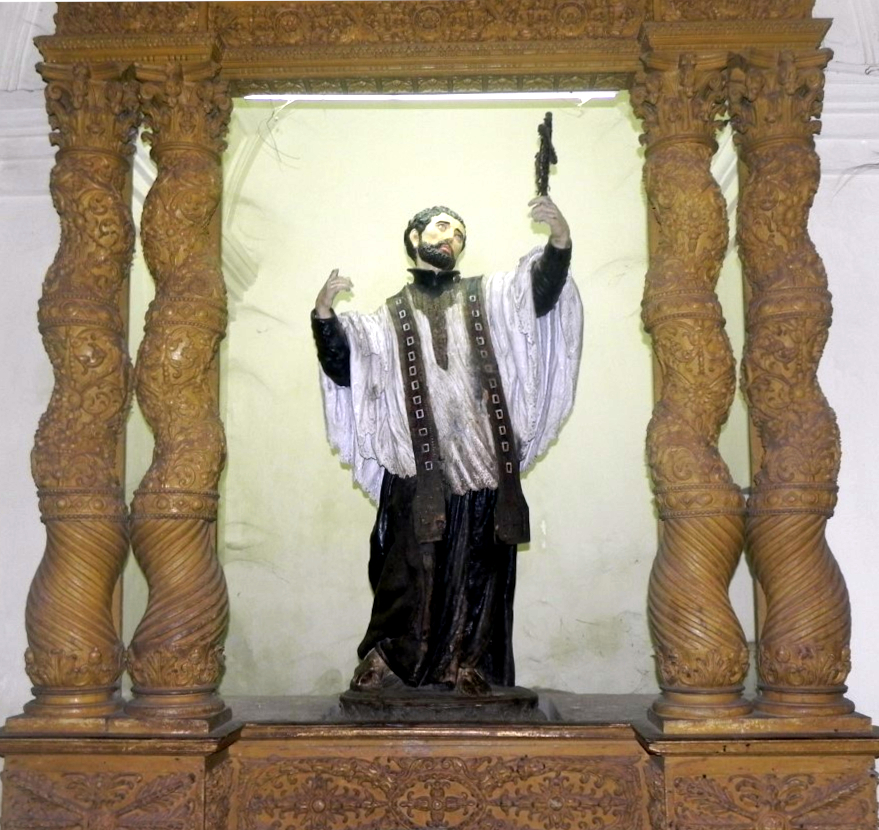St Francis Xavier inspires us to keep our feet moving. He was a man on fire with God’s love! He was aware of his fears and frailties, but dared to take on new challenges and dream new dreams

The statue of St Francis Xavier in the Basilica of Bom Jesus at Old Goa.
A few days ago, a good number of local Goan folks and tourists mingled at the “Samba Square” during the Carnival 2022. If Francis Xavier were alive today, would he have stopped and dropped by to say “hello” to those who were enjoying the music? Perhaps he would have mingled briefly with the crowd, said “Dev bori sanz dium” to a few families, tasted the choris pulao, listened to Lorna croon, and then, with a quick “Dev borem korum,” moved on to the neighbouring villages to continue his mission!
I like to think of St Francis Xavier as a man very much relevant today, not merely a “painted saint” of the past, one without any failings. The Church around the world is celebrating the 400th anniversary of the canonisation of our Goencho Saib on March 12, along with Ignatius of Loyola, Teresa of Avila, Philip Neri, and Isidore the Farmer.
Archbishop of Goa and Daman Filipe Neri Ferrao described St Francis Xavier “undoubtedly one of the greatest evangelisers the Catholic Church has known, a fact that earned him the title of Patron of the Missions.”
Xavier undoubtedly deserves this title as he was a very versatile man and his life has much to teach us today.
Inner transformation
First of all, Xavier’s life teaches us to be open to inner transformation. As a young man, having been born into nobility at the family castle of Xavier, Francis was full of himself. At the University of Paris from 1525, he looked to become famous. And then came another Basque student, Ignatius of Loyola in 1529, who disturbed Francis with the words of Jesus: “What does it profit a man if he gains the whole world and loses his soul?”
Through the Spiritual Exercises guided by his friend and companion Ignatius, he became aware of himself with his strengths and weaknesses. He realised that even though he was a sinner, yet he was called to follow Jesus Christ. He discerned and chose to be Christ’s disciple in the service of God and humankind.
Humble service
Secondly, Xavier’s life teaches us to serve humbly. In today’s world where many leaders make a show of bravado and trumpet their deeds before others, Xavier’s life teaches us to be humble. He stooped to conquer. He had everything before him: he was on track to have a great life at the University of Paris. Here, power, fame and wealth were within his easy reach.
But he chose another path, that of giving up everything and working to spread the Gospel message of God’s love and mercy. On May 6, 1542, Xavier entered the waters of Goa, sailed down the Mandovi River and finally disembarked at Old Goa. He chose to stay at the local hospital rather than the palatial quarters of the Bishop, so as to be more easily available for service to the local people.
Mission-focussed
Thirdly, Xavier inspires us to keep our feet moving. He was a man on fire with God’s love! He was aware of his fears and frailties, but dared to take on new challenges and dream new dreams. At the request of King John III of Portugal, two Jesuits were initially chosen for the mission to the Indies, but were unable to set out. Ignatius then missioned Xavier who accepted willingly and readily though totally unprepared for the challenge of the Indies.
On April 7, 1541 (Xavier’s 35th birthday) the ship ‘Santiago’ sailed East with Xavier on board. He was a mission-focussed man and did not waste time. Soon after he arrived in Goa, he made himself available by visiting the sick, serving lepers, preaching to the Portuguese, and exploring new options for mission.
Even though he did not know Asian languages, he worked diligently teaching and preaching in coastal South India, the Malay Archipelago, Moluccas, and even Japan.
Adaptive skills
Fourthly, we learn from Xavier to be flexible. Yes, the Jesuits started out as itinerant preachers, but both Ignatius and Xavier changed when they experienced God’s Spirit in new ways.
In Goa, Xavier foresaw tremendous opportunities as he accepted to run the College of St Paul which was handed over to the Jesuits. He transformed the institution into a place of Higher education, and of character-building for its students and catechists who served in the Diocese of Goa.
Another example of Xavier’s adaptive skills was the founding of the first Christian mission in 1549, in Kagoshima, Japan. He knew neither the Japanese language nor understood Buddhism practised in Japan.
On one occasion, when he realised that his poverty would not help him in his work with the Japanese, he used a clever ruse. He rented a carriage drawn by horses, dressed in silk robes, and when he arrived ceremoniously in Yamaguchi, this time he was welcomed at the Daimyo’s Palace!
Joyful generosity
Finally, Xavier’s life inspires us to move from mediocrity to joyful generosity for God’s greater glory. Those who knew him wrote that “he walked with joy” and he moved around “with laughter in his mouth.”
From the Spiritual Exercises that he did under the guidance of his friend, Ignatius, he was driven to do “more” and “greater” things for God. The paramount question that always accompanied Xavier was: What more can I do for God and God’s people?
(The writer is Provincial of the Goa Province of the Jesuits)